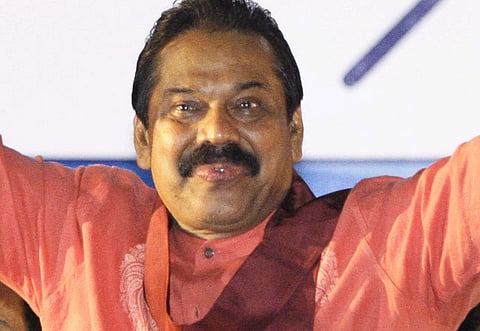Rajapakses' grip tightens
Activists and business types warn of a family rule in Sri Lanka that has become more centralised, heavy-handed and authoritarian

The president of Sri Lanka, Mahinda Rajapakse, may well feel pleased with himself. On the face of it, more than six years after his first election, his prospects are still remarkably rosy. The economy clips along at about 7 per cent a year. Rajapakse's coalition controls over two-thirds of parliament, and opposition parties are so weak that a senior minister chuckles about not being held to account.
The chief political threat, Sarath Fonseka, a former general turned popular presidential candidate, is in a Colombo jail. There, says an MP who has visited him, he wears short trousers and passes his days in a cell known as the "Scouting Room", complete with a portrait of Baden-Powell.
Confidence lay behind the heavy hint dropped on February 8 by Basil Rajapakse, the economy minister, that Fonseka, a classmate chum, might soon leave prison and even return to politics. Basil is one of several Rajapakse brothers, the one reckoned to be the brains of the ruling family. Possibly he thinks that Fonseka may make a fool of himself at large, while enjoying martyr status behind bars.
On independence day, February 4, the president chided his countrymen, urging them to be more grateful. It is true that since a bitter end in 2009 to a long, wretched ethnic civil war, the lot of many Sri Lankans has steadily improved. The state of emergency is gone, even if other draconian laws remain. Many of the tens of thousands of Tamils detained in the north at the war's end have been released. New roads, ports, railways and power stations are spreading. In Colombo various swanky structures are rising and the ground has been cleared for a lotus-shaped tower intended to be South Asia's tallest.
How, then, to explain a persistent grouchiness among Sri Lankans? The past months have brought strikes, riots and protests by students, railwaymen, prisoners and public workers. The opposition Tamil National Alliance swept local elections in the north, leaving the president's party in the dust. Ranil Wickremasinghe, the main Sinhalese opposition leader, no ball of energy himself, claims to see wide "protests and agitation against unfulfilled promises".
Graft in infrastructure
Hushed cafe talk about a "Colombo spring" overstates things, but Rajapakse may remember how such grumbles and protests helped his own rise to power. Most outsiders focus on his headaches abroad. In March the United Nations will consider a resolution on Sri Lanka over suspected killings of thousands of Tamil civilians and rebel prisoners in the last days of the war. Last month Hillary Clinton, the US secretary of state, said America would vote against Sri Lanka. A retired senior official frets about an "adversarial lock" closing on his country.
Yet matters at home may be more troubling. Rumours of graft in infrastructure deals persist. A big investor calls the government "extremely corrupt and arrogant". In the past this businessman went along with kickbacks of a "few million dollars: this is a developing country, after all"; but he baulked once demands rose to tens of millions of dollars to win tenders for projects funded with Chinese loans.
In the capital, commentators, activists and business types warn of a family rule that has become more centralised, heavy-handed and authoritarian. Here, the defence secretary, Gotabaya Rajapakse, is most often mentioned. Whereas the president has an earthy charm that appeals to rural Sinhalese, Gotabaya wields power more bluntly. He presides over both army and police, 300,000 armed men in all — just what a good democracy needs, he says. This year the defence budget will top $2 billion (Dh7.34 billion), a fifth of all public spending — an alarming share for a country now at peace. The army's role in business is also growing. An economist and opposition figure, Harsha de Silva, says the army is getting into hotels, farming, construction, golf courses, sports stadiums and even running roadside tea stalls.
A Tamil leader says the army oversees "oppressive, insulting, humiliating" rule in the north, with tales of land grabs, murders and rape. In Colombo political observers worry about the militarisation of politics. Gotabaya disavows any interest in politics: he is an army man, he says. If the ruling family feels it can rely on the army, it may worry less about appealing to voters; one day, it may even refuse to "go home". Unsurprisingly, the Rajapakses see it otherwise. "We brothers are a very successful family, maybe because we grew up close," says Gotabaya. The brothers' rule looks assured for a while yet.


